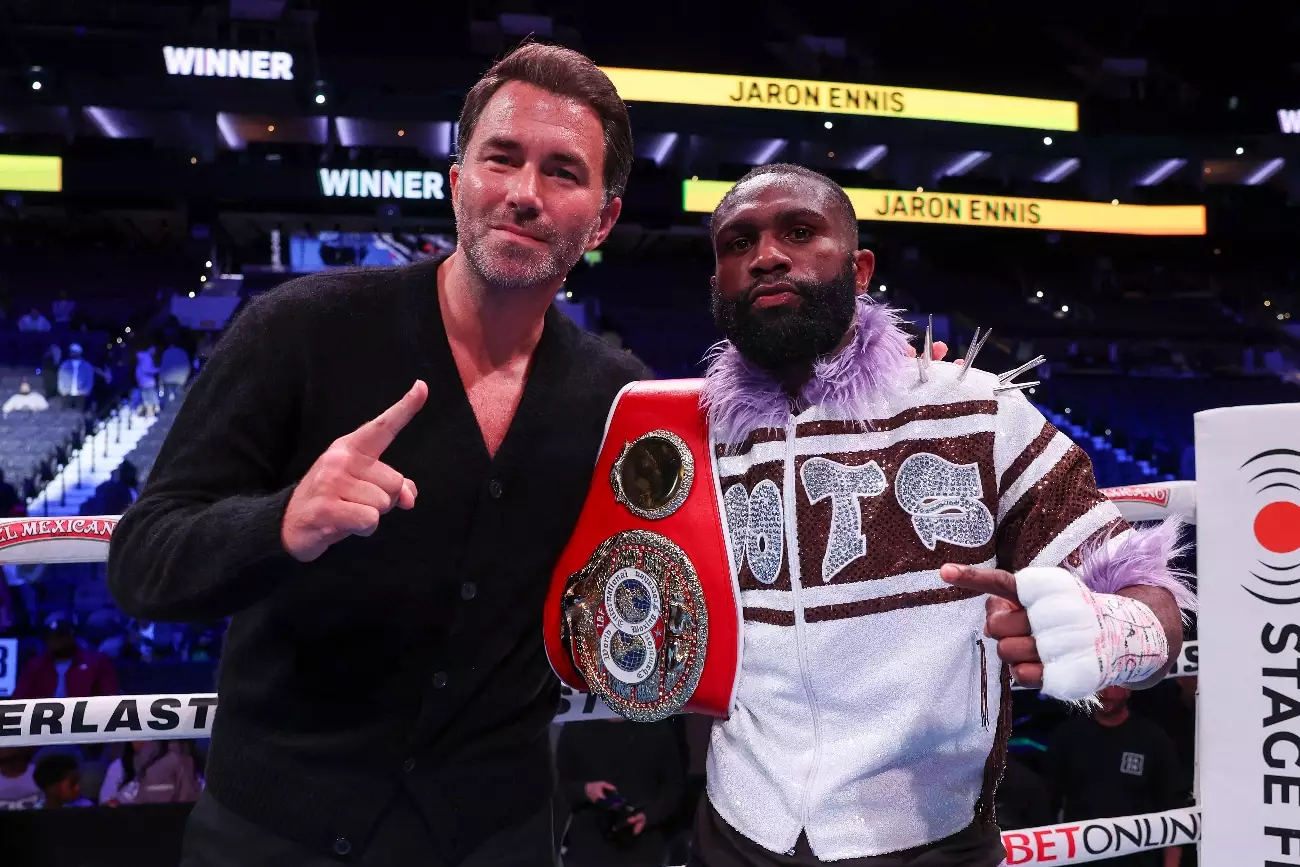Jaron ‘Boots’ Ennis stands as one of the most promising talents in boxing today, particularly in the welterweight division where he boasts an impressive record of 33-0 with 29 knockouts. Recently, Eddie Hearn, a well-known promoter, has made headlines by discussing DAZN’s significant investment in Ennis and the pressing need for him to unify the welterweight titles. However, this situation uncovers a myriad of complexities that warrant a deeper analysis, especially concerning his future options at 147 pounds versus a possible move to 154.
As Eddie Hearn pointed out, Ennis may not have much time left before he needs to make a crucial decision about his weight class. Hearn is adamant about Ennis’s current pursuit of unification fights within the welterweight division, which has been a highly sought-after goal for the rising star. The champions at 147 pounds—Mario Barrios, Eimantas Stanionis, and Brian Norman Jr.—have drawn criticism for their lackluster engagement, bringing financial negotiations into disarray. The difficulty in enticing these champions to fight Ennis has left Hearn with limited options for solidifying Ennis’s legacy at welterweight before the window closes.
While Hearn’s aspirations may seem noble, the reality of negotiating with hesitant champions raises serious questions. Can Ennis realistically unify the titles against these fighters? If not, what does that mean for his future as a boxer? Hearn claims that the most suitable strategy involves pursuing other champions, but the nature of these discussions might reveal a dwindling commitment to the welterweight scene.
Hearn has emphasized the importance of taking opportunities for unification fights sooner rather than later. This urgency springs from the very essence of boxing—where careers can quickly fade if decisions are protracted. The notion that a significant fight against someone like Vergil Ortiz Jr. looms on the horizon for February 22nd in Riyadh has generated buzz; however, it also creates a juxtaposition against Ennis’s intentions at 147. Hearn seems to hint that DAZN’s preferences may be driving this pivotal moment and could ultimately determine Ennis’s trajectory.
There lies an inherent tension between the desire for immediate financial gain—pursuing more lucrative fights against recognized names—and the long-term aspirations of making history as an undisputed champion. The prospect of being unable to secure appropriate fights at welterweight can serve as a catalyst for Ennis’s team to reassess their strategy. Ennis has to wonder if vacating the welterweight division could provide fresh opportunities for marquee matchups that can bolster both his reputation and earnings.
Should Ennis move up to the junior middleweight division, an exciting world of potential confrontations opens up. With fighters such as Terence Crawford and Tim Tszyu poised to engage, the potential to increase both popularity and earnings while still achieving significant marquee matchups exists. Boxing fans recognize that with great risk comes great reward, but moving up would also mean leaving a division where he had the potential to crown himself as an undisputed champion.
Despite this enticing prospect, skepticism lingers. Many fans and critics argue that Hearn and DAZN may not actually want Ennis to transition to 154 due to his less-than-stellar showing against Karen Chukhadzhian. Remaining at welterweight could seem like an attractive option for Hearn as he continues to attempt unification in a static environment—a gamble that may not pay off, given the challenges of producing the lucrative fights.
The crossroads that Jaron ‘Boots’ Ennis faces is a pivotal moment not just for him, but for the broader welterweight and junior middleweight landscapes. With pressures from DAZN, Hearn’s ambitions, and the unyielding nature of boxing economics, Ennis’s next move will not only dictate his career but could also reshape the divisions he occupies. Strategic choices made now will resonate for years to come, determining whether Boots becomes a unification champion or a fighter who left behind untapped potential in favor of higher-profile bouts elsewhere. Ultimately, this decision encapsulates the complexities of modern boxing, where the fight for legacy must contend with the fight for financial stability.

